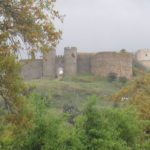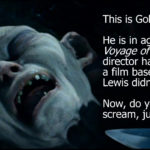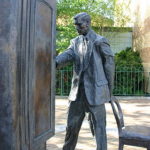Seeing In The Cave
Michael, who is 36, now often refers to gay life as a kind of cave … Had Michael been secretly unhappy as a gay man, and was he now projecting that onto all gay-identified people? I broached the question later that night at his small off-campus apartment, where we sat in his barren kitchen eating Oreo cookies. “Well, you can’t see how dark it is in a cave when you’re in it,” he said. Benoit Denizet-Lewis, “My Ex-Gay Friend,” The New York Times
 Horror is trending on Speculative Faith these days, and I’m up on the trends, at least until tomorrow. So here goes another round.
Horror is trending on Speculative Faith these days, and I’m up on the trends, at least until tomorrow. So here goes another round.
One of the most popular arguments for horror, in Christian circles, goes like this: In this fallen world, we need to face the darkness and confront the reality and horror of evil; we must not look away.
This argument has long bemused me, the way it is always bemusing when people insist on facts that, while incontestably true, are of no great relevance to the conclusion being drawn. I can never track the intellectual leap between We need to face evil and Let’s break out the horror novels! Why must the first lead to the second? Personally, I can’t even glance at the headlines without facing the reality of evil.
The news, like history, is an ever-renewing pattern of tragedies and atrocities, and awful cruelties at home and abroad. To the extent that humanity stands in need of an education in evil, it’s not because we lack exposure to it. It’s because, in the cave, it’s hard to see how dark it is.
And to see, you need … light.
Some people, I know, work backward – recognizing first the existence of evil, and then the existence of good, and finally following the trail all the way back to God. But exploring the darkness is not the only way to understand it; it’s not even the best way. If you want to know what darkness is, your best object of study is the light.
George MacDonald once said that only God knows and hates evil. I am sure beyond all doubt that God hates evil more than I do, more than any of us does. And it’s not because He has seen more of it – because He has, if I may dare the analogy, been reading horror while the rest of us have been reading prairie romance. The heart of it is not that God knows more than we do, although He does. It’s that He’s better than we are.
Only God fully knows evil because only He fully knows goodness. No one, Jesus said, is good except God alone – the everlasting burning with whom sinners cannot dwell. (Isaiah 33) The Bible shows us again and again God’s anger against sin, His implacable hatred of evil. The key to understanding it is His holiness.
Nothing more clearly exposes the nature of darkness than the light. When Isaiah saw a vision of God, he lamented, “I am a man of unclean lips, and I live among a people of unclean lips!”
 When Jesus showed His divine power in giving the fishermen a miraculous catch of fish, Peter pleaded with Him, “Go away from me, Lord; I am a sinful man!”
When Jesus showed His divine power in giving the fishermen a miraculous catch of fish, Peter pleaded with Him, “Go away from me, Lord; I am a sinful man!”
After Job heard God proclaim who He was, his confidence in his righteousness was finally broken and he confessed, “My ears had heard of you but now my eyes have seen you. Therefore I despise myself and repent in dust and ashes.”
As C. S. Lewis wrote, “You understand sleep when you are awake, not while you are sleeping. … You can understand the nature of drunkenness when you are sober, not when you are drunk. Good people know about both good and evil; bad people do not know about either.”
If we know God, we will know ourselves. If we know what goodness is, we will know what evil is. The light will give definition to the darkness.
This is the safest, truest path to revelation. The backward path remains, and many people have followed it to the truth. The debate about darkness in fiction is worth having. But the indisputable point that darkness is a reality to be faced is not the end of the debate; it is the beginning.












































Very well put!
I don’t think this works as a general argument, mostly because it would mean that those who are really well versed in the good would be equally wise about evil. I generally don’t find that to be the case, to the point where the most good tend to be the most naive about it. I mean, they can know not to do it, but you can get a lot of caricatures about it.
Like in Christian fiction, one of the worst things they can write about is atheism, because unless you’ve fallen away and entertained the idea (or have incredible empathy) you won’t get it. You can’t really learn from the light what the absence of it feels like, even if its really the best thing not to ever leave that light at all. The Christian artist has to understand that atheism, but render it for people in the light so they can understand without embracing it.
Lot of them don’t, though.
Christian horror in specific is tough, though. I think it’s more the genre allows you to deal with evil in ways that give you a lot of freedom to render it. Horror is a lot easier to be figurative and allegorical, as well as have direct supernatural action; fantasy is that way too, but tends to be one step removed from the subject.
I think you hit on something here. To my understanding, one of the most powerful shields against evil ever rising up again (in addition to the wounds in Jesus’ body) is the witness of those who have fallen into evil but have been redeemed from it. I believe this witness will be one of the vocations of the redeemed, a mission that will forever barricade the universe against a repetition of the horrors of sin.
Experience counts for a lot. Who can know the dizzying heights of love better than one who has broken away from love and fallen into the horrifying abyss of evil, feeling the full force of the separation from love that sin causes.
This horrific experiment in rebellion showcases God’s character in a way that nothing else can, could, or ever will.
I think you hit on something here. To my understanding, one of the most powerful shields against evil ever rising up again (in addition to the wounds in Jesus’ body) is the witness of those who have fallen into evil but have been redeemed from it. I believe this witness will be one of the vocations of the redeemed, a mission that will forever barricade the universe against a repetition of the horrors of sin.
Experience counts for a lot. Who can know the dizzying heights of love better than one who has broken away from love and fallen into the horrifying abyss of evil, feeling the full force of the separation from love that sin causes.
This horrific experiment in rebellion showcases God’s character in a way that nothing else can, could, or ever will.
The good can often be naive in dealing with people worse than themselves. Jesus Himself, in the parable of the shrewd manager, said as much: “For the people of this world are more shrewd in dealing with their own kind than are the people of the light.”
But shrewdness is not exactly the same as wisdom. There is a difference between being shrewd about dealing with evil people and being wise about evil itself. At least the good, however naive, know what evil is.
Great post Shannon. I always love your insights. They always stimulate my thought…
I do agree that we should focus on the light, but still, a story must describe the darkness of the cave or there is no context. It’s the nature of our stories. For instance, if I take away all of the horrific things they did to Jesus, I haven’t told the story. The story of God’s light must be contrasted against a description of the depths of evil’s darkness.
Gene Veith says that in good stories, “children are taught the attractiveness of virtue and the repulsiveness of evil not so much by abstract precept – and certainly not by school’s ‘values clarification exercises’ – but by rooting for virtuous heroes and being inspired by a good story to emulate their behavior…imaginative wrestling with conflicts is exactly how stories teach morality and build character.”
In a story then, the horrific elements must be described or no one knows exactly what virtue is wrestling against. The deeper the darkness, the more power and beauty a story of light will have. The blazing center of the glory of God is the cross of Christ’s suffering…
The more I think about this, the less black and white it seems…
Thanks, Brent.
Probably the only bone of contention between the sides of the horror debate is how far we can, or ought, to go into the darkness. Conflict makes stories, and bad people and bad things make conflict. You can’t really avoid some degree of darkness, and no Christian wants to avoid the light, either.
I am really enjoying this continuing discussion on horror, because the arguments for, against, and in the middle hit on some points that those adamantly opposed to or adamantly in favor of horror often miss.
What I’ve seen in the horror that seems to best emulate a Christian worldview (whether or not the author intended to be Christian), is that good horror does not sensational horror to grab the reader’s attention, but either represents the darkness as the powerful thing that it is, or recognizes righteousness as the consuming fire that it is.
For example, That Hideous Strength by C. S. Lewis seriously creeps me out. Prophetic nightmares, technology and demonology animating a decapitated head, ancient curses fulfilled in the modern day… It is seriously freaky, folks. It recognizes the power of That Hideous Strength–the power of the devil, and it shows what happens to people when they crave that power. But, at the end, the power does not conquer. The climax is presented as though God laughs at the devices of men, and the whole Tower of Babel crumbles.
The second example, of the consuming fire of righteousness, is something which I presented in my book REFLECTIONS. The horror is not external, but internal. We are, ourselves, our worst horror, and we prefer that familiar horror to the “clean” horror of submitting our entire being to the One who demands all or nothing. It’s a fear of our own darkness, set against a fear of the light. I think that sort of story can shock a reader into honesty about his spiritual state.
I’m not a fan of wallowing in darkness, or just flinging around ghoulishness for some cheap goosebumps. Shannon, I like your point that
Horror for horror’s sake is useless, but horror for the sake of better illuminating some truth, horror (in some weird way) used as light… I see real value in that.
Right on Yaasha! You said it so well. By the way Shannon, I loved the point you made that Yaasha highlighted as well.
Light v. darkness is not either/or in the Scriptures. Too often arguments against THAT (what opponents of horror really think of it) are based on an emotional appeal that sounds good — we need to look at the light — but such appeals don’t tell the rest of the story and certainly don’t align with Scripture. Read Mark 5:1-20. This is God’s own horror story in His Gospel and the justification for writing in this genre IF the following things are kept. The story begins in darkness, the place of death, the tombs. What Satan loves. The antagonists are demons, thousands of them, controlling and indwelling a man to such an extent the imago Dei is virtually gone. We have an atmosphere of utter fear and a demonstration of the Devil’s hand — the crying aloud, the smashing of the chains, the terror this man brought to the nearby community. This is horror. This is absolute horror. This is from the pen of John Mark, and ultimately from the Pen of its real Author. Then the story turns. Jesus appears, and the demons make absolute obeisance before Him and beg Him not to bring judgment on them. Then we have that creepy-weird flowing back and forth between singular and plural, “My name is Legion, for we are many” — an exercise in subtlety that would do HP Lovecraft proud. And finally we have the absolute, complete and total victory of the Lord Jesus Christ over the demons, crushing the Devil’s hand and restoring this man to his right mind and his acceptance of the Lord Jesus. This is what Tolkien meant by the story’s “turn,” which brings the eucatastrophe, the joy of Jesus the Son of God triumphing over the darkness and destroying it, breaking its power. Make no mistake. Mark 5:1-20 is the paradigm for yes, Christian horror, and if you have an issue with it, take it up with Jesus. He’s the One Who wrote it. And He wrote it as He wished: horror. A horror swallowed up in His Power and defeated. This is how God intends Christian horror to be. Those of us who write it need make no apology, for we rest on what we find not in our own human speculations but on what God says to us in His Holy Word. The way He wrote it.
It’s just odd to me how many of these articles come down against horror. If speculative fiction of the sci/fi fantasy is …like, horror is the redheaded stepchild in the less-reputable side of the family
“I can never track the intellectual leap between We need to face evil and Let’s break out the horror novels! Why must the first lead to the second?”
Shannon, the argument for Christians writing and reading horror has not occurred in a vacuum. Mostly, it is a reaction to an industry of over-sanitized, “safe,” “inspirational,” “family-friendly” fare. The leap isn’t so much TO horror as it is AWAY from fiction that avoids realism and darkness. Yes, “The light will give definition to the darkness.” But stories without darkness just aren’t real.
I don’t think Shannon ever said that stories shouldn’t have any darkness nor do I believe she ever implied it.
I don’t think Shannon ever said that no stories shouldn’t have any darkness nor do I believe she implied it.
Pro-horror people tend to argue like this: “We need to face evil. That’s why horror novels are good!” And I’m like, “Um, okay. If that’s how you want to face it …”
And then turn around and say that anti-horror people are afraid of facing evil or even reading about just because they don’t want to read gruesome plots with gruesome details.
And, honestly, to understand evil do we really need to read a gruesome scene in GREAT detail?
Yes, you can tell me what happened, no matter what it is. You can give me some details of what horrendous thing occurred. But don’t give me so much detail that I throw up.
Heather, if you agree that stories SHOULD have darkness when necessary, all we’re at odds about is degrees. I’m suggesting that much of the argument FOR Christians writing and reading horror is a reaction against sanitized Christian fiction.
I guess that’s true. To me, reading and writing horror is an extreme reaction to sanitized fiction. A balance, like in most things, needs to be made. I’m not exactly certain what you mean by “sanitized” — like clean or something? — but in my own personal experience, I haven’t read that. The heroes/or heroines are always fighting evil. Even great ones. In fantasy, sci-fi and contemporary.
Side note, I think you can be clean and have darkness at the same time.
Anyway, that’s just my opinion. Not a very popular one, but I’ll live. Thanks for your input! I do enjoy discussions, however brief. 🙂
P.S. Sorry about that partial repeat comment. Had trouble. 🙂
Hi,
Great discussion! If you’re interested, I’m a church minister from the UK who writes a monthly horror column in the print magazine The Fortean Times. I also host a podcast called http://www.theflicksthatchurchforgot.com which explores where horror and faith intersect.
Hope you find it interesting.
Many thanks
Peter